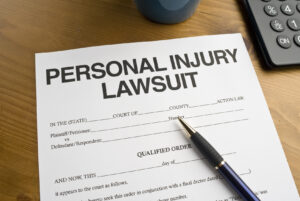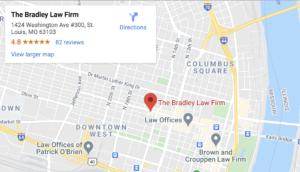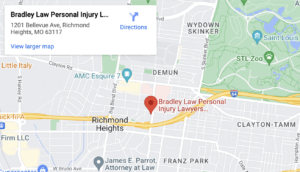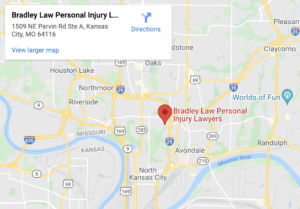
A personal injury case is a legal demand for compensation after you suffer an injury that Missouri law holds someone else liable for. Usually, but not always, liability is based on the defendant’s misconduct. Some personal injury claims are also crimes. If you prove your personal injury claim, you can qualify for monetary compensation.
Understanding what a personal injury case is can help you navigate this challenging process.
Theories of Liability
Missouri recognizes four main theories of liability–negligence, strict liability, intentional misconduct, and vicarious liability.
Negligence
Negligence is the most common basis of a personal injury claim.
To win a negligence claim you must prove the following elements:
- Duty of care: The defendant must have owed the victim a duty of care.
- Breach of duty: The defendant must have failed to meet the demands of their duty of care.
- Damages: The victim must have suffered actual harm.
- Causation: It must be true that but for the defendants’ negligence, the victim would not have suffered damages. The victim’s damages must have been foreseeable in light of the defendant’s negligence.
You must prove all of these elements by “a preponderance of the evidence” to win.
Strict Liability
Under strict liability, you can win without proving the defendant was at fault. In a product liability claim, for example, you can sue the distributor of a dangerous product for a manufacturing defect.
Intentional Misconduct
Injuries caused by intentional misconduct are often (but not always) crimes. Assault and battery are two examples.
Vicarious Liability
Sometimes, one party bears liability for the wrongdoing of another. For example, under the right circumstances, Missouri law holds employers responsible for the misconduct of their employees.
Burden of Proof
The burden of proof tells you who must prove an assertion and how much evidence they need to prove it. Normally, it is the victim who must prove their claim. The defendant does not have to prove that the victim’s claim is untrue. Instead, the victim must prove that their claim is true. There is one exception. If the defendant raises an affirmative defense, such as expiration of the statute of limitations deadline to file a lawsuit, then the defendant must prove their defense.
You don’t have to prove your claim beyond a criminal doubt—that standard of proof is reserved for criminal prosecutions. Instead, you must prove every element of your claim by “a preponderance of the evidence.” That means you must prove that your version of events is more likely than not to be true, even if the likelihood is as low as 51% true to 49% false.
Common Personal Injury Cases
Following are some of the most common categories of personal injury claims:
- Car accidents
- Truck accidents,
- Motorcycle accidents
- Bicycle accidents
- Pedestrian accidents
- Bus accidents
- Train accidents
- Plane crashes
- Slip and fall accidents
- Product liability claims
- Medical malpractice
- Dog bites
- Construction accidents
- Nursing home abuse
- Sexual assault
- Wrongful death, if a victim dies
Missouri recognizes many more types of personal injury claims not listed above.
Damages
The term “damages” means money that you receive as a consequence of winning your personal injury claim. Missouri, like other jurisdictions, recognizes three different types of damages. These damages include economic damages, non-economic damages, and punitive damages.
Economic damages are easily countable damages such as medical expenses and lost earnings. If it is easy to place a dollar-and-cents value on an element of your damages, it probably qualifies as economic damages.
Non-economic damages are compensation for intangible losses such as pain and suffering, and mental anguish.
Missouri courts only award punitive damages on rare occasions. Their purpose is to punish a defendant for particularly serious misconduct. You might demand punitive damages in a wrongful death claim arising from a murder, for example. You cannot win punitive damages unless you also win economic and/or non-economic damages.
Defenses
There are many possible defenses against a personal injury claim, including the following:
Lack of Evidence
No matter what, you must prove every element of your claim by a preponderance of the evidence. Although this determination is subjective, the defendant can ask the judge to dismiss your claim if you fail to do so.
Comparative Negligence
How do you decide on damages when both parties share the blame for the accident? In Missouri, the court will divide liability for damages based on each party’s percentage of fault. If you are 20% at fault, for example, you will lose 20% of your damages.
Determining comparative fault can get tricky in settlement negotiations. A lawyer can help you respond to an allegation of comparative negligence.
Statute of Limitations
The statute of limitations sets the deadline by which you must file a lawsuit or abandon your claim. The Missouri personal injury statute of limitations is five years after the date of the injury. For wrongful death, it is three years after the victim’s date of death.
Failure to Mitigate Damages
The defendant is not obligated to pay for any damages that you could have avoided through the exercise of reasonable care. This may include failure to wear a motorcycle helmet, for example.
Assumption of Risk
Assumption of risk applies when the defendant is not liable for your injuries because you were aware of the danger of an activity and chose to participate anyway. Typically, you will be asked to sign a liability waiver before engaging in such an activity. Skydiving is one example.
Fee Structure
Personal injury lawyers, unlike other lawyers, don’t usually charge by the “billable hour.” Instead, they use a contingency fee system. Under this system, your legal fees amount to a pre-agreed percentage of your ultimate compensation. It doesn’t matter whether you get this compensation from a courtroom verdict or a private settlement. If you receive nothing, your legal bill will be zero.
Under the contingency fee system, you can hire a lawyer without a dime in your pocket.
An Experienced St. Louis Personal Injury Lawyer Can Help You
Personal injury law is complex and nuanced. It differs slightly from state to state, and no two personal injury cases are exactly alike. If you believe you might have a personal injury case, contact a St. Louis personal injury lawyer from Bradley Law Personal Injury Lawyers at (314) 400-0000 for a free initial consultation.




